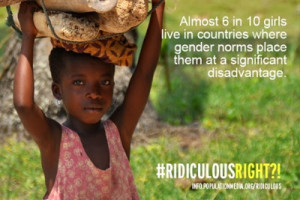The Right to Family Planning Is Not Ridiculous
Jul 11th, 2018 | By admin | Category: Other Resources, Reproductive Rights/Women's RightsBy Suzanne York.
Unless you’ve been off the grid, chances are that you are at least somewhat aware of the battle taking place in the U.S. over reproductive rights. With a potential new conservative Supreme Court justice poised to join the court, it is a dire time indeed for those who support women’s health and rights.Perhaps, though, this is an opening to talk not only about health and voluntary family planning services, but also a chance to raise awareness on unintended pregnancies and reduced reproductive rights lead to increased population growth. It is a needed conversation at all levels – local, national, global.
In a world of 7.6 billion people that is currently growing by nearly 84 million per year, talking about reproductive health and rights is more important than ever.
World Population Day
What better day to talk about these issues, than July 11th, which is designated World Population Day? This year’s theme is “Family Planning is a Human Right.” A woman should be able to decide when and if to have kids, and have access to reproductive health care services.
There are hopeful signs in some other countries of the importance of women’s reproductive rights and health and the impact of a growing population. This past May, voters in Catholic Ireland recently repealed a longstanding ban on abortion.
In Egypt, the government is looking to increase the use of contraceptives and improve women’s health. The country’s population currently stands at 100 million and is still rapidly growing. Alarmed by this growth and seeing it as drain on the economy, the government is rolling out a “Two is Enough” campaign.
Last year, President Abdel-Fattah el-Sissi said “The two biggest dangers that Egypt faces are terrorism and population growth, and this challenge decreases Egypt’s chances of moving forward.”
With support from the United Nations and U.S. Agency for International Development, the campaign will provide maternal and child health care, plus cash support to 1.15 million women in the country’s poorest families.
Other countries in Africa are well aware of the impacts of their rapidly growing populations, a topic often discussed by government officials. Take Nigeria, for example. The UN projects that Nigeria will become the world’s third most populous nation by 2050, with a population of 399 million people.
Recently, the Nigerian Federal Government launched three key reproductive health documents towards scaling up family planning services in Nigeria, and the Minister of Health has challenged state governors on the need to invest more in family planning programs.
Ghana is another country with a fast-increasing population. The former president, Jerry John Rawlings, recently expressed concern about the lack of family planning. He predicted more challenges if measures were not put in place to curb the rate at which citizens give birth and that, giving birth to more children will among other things, put pressure on the country’s limited infrastructure and resources.
And back in the U.S., even though it is on shaky ground at a federal level, there are a number of states that are supporting women via greater access to birth control prescriptions, and for longer periods of time, easing a burden placed on many to simply get access to contraceptives.
Take Action
If you are a voter in the U.S., contact your congressional representative to co-sponsor the Global Health, Empowerment, and Rights Act (“the Global HER Act”) that calls for repealing the Global Gag Rule that threatens U.S. funding of global organizations working on family planning and reproductive health. Women around the world (and their families) are impacted by the detrimental affects of this horrendous policy.
American women, too, are now affected by a domestic gag rule, with attempts to cut access to affordable birth control services and information for low-income women via Title X.
An often overlooked action is simply talking about difficult issues. Whether it is reproductive health, women’s rights, or population growth, we are only hurting ourselves by ignoring these issues, or misunderstanding the impacts. Transition Earth is working to bring such conversations front and center. Even the so-called mainstream media is focusing attention on population growth – see this Washington Post op-ed.
Population Media Center (PMC) has also put out a call to open up the conversation about the absurd disparity in reproductive rights around the globe and focus attention on the restrictions on family planning and reproductive health. People are encouraged to use the hashtag #RidiculousRight?! and spread the word that the right to family planning isn’t ridiculous at all. See PMC’s social media toolkit for ideas on how to use #RidiculousRight?! in support of the right to family planning.
Support Women Everywhere
There are approximately 214 million women and girls in developing countries alone who want to avoid pregnancy but aren’t using modern contraception due to lack of access and education on contraceptive services and also social and cultural factors. In the U.S., the government is chipping away at the Affordable Care Act that has helped many women gain access to reproductive health and contraceptives. Let’s support all women’s right to family planning and above all, their right to a healthy and thriving life of their own choosing.
Suzanne York is Director of Transition Earth.

![Women's March 2018, Oakland, CA [photo: Suzanne York]](http://populationgrowth.org/wp-content/uploads/2018/07/womens-march-239x300.jpg)

